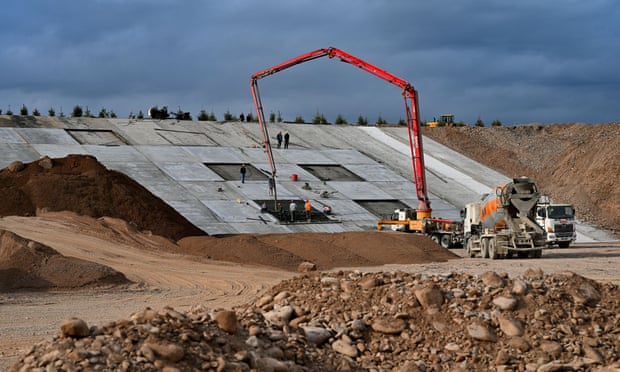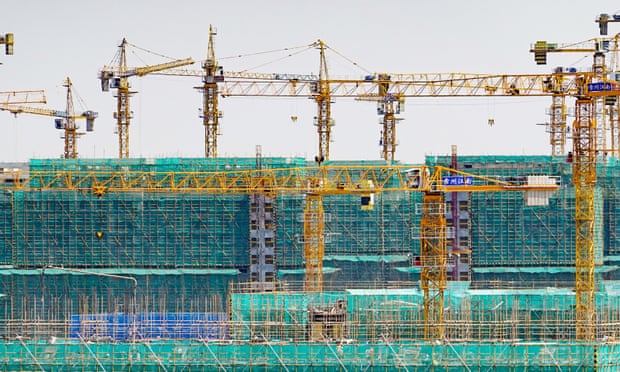Mortgage strikes threaten China’s economic and political stability | China
7 min read [ad_1]
The alarm bells are ringing louder. Very last week, hundreds of depositors gathered in front of the Zhengzhou department of the People’s Bank of China in the provincial money of Henan, demanding their frozen existence price savings held in rural financial institutions. A day later, tens of 1000’s of property owners threatened to quit paying out home loans on scores of unfinished housing jobs they experienced ordered. All of this happened in a week where the officials noted lacklustre second-quarter financial efficiency.
China’s financial system is going through a harmful cocktail of stalling development, superior unemployment, spreading mortgage loan payment strikes and continued Covid shutdowns that threaten to explode with significant social and political outcomes.
The worsening meltdown in the country’s debt-laden residence market is at the heart of the dilemma as the poisonous $300bn (£250bn) financial debt pile unleashed by previous year’s collapse of the large developer Evergrande gradually infects the total financial state.
The initial official reaction to the lender demonstration was to phone in squads of basic-clothed enforcers to use violence to split it up. Authorities have since claimed the lender has been taken above by “criminal gangs” and have promised to commence letting obtain to income.
When it emerged very last 7 days that homebuyers across the state were being banding together to refuse payments on home loans on households still left unfinished by financial debt-distressed builders, it was the one more signal that the religion of standard Chinese people today in the property marketplace and broader banking sector is beginning to dissolve.
“Why do I have to pay out home finance loan when the assets I bought has nonetheless to be completed?” reported a single indignant social media person right after seeing a viral documentary about how hundreds of homebuyers in central Chinese city of Xi’an have to are living in unfinished apartments.
Beneath force, Beijing’s regulators vowed final Thursday to support community governments end residence jobs on time. By Monday, the federal government was reportedly coming up with steps to permit owners to quickly halt mortgage payments on unfinished home initiatives without the need of influencing their credit scores.
This is a precarious instant for China’s ruling Communist occasion in the run-up to its 20th social gathering congress later on this yr, mainly because it signals falling confidence in a year that was intended to prioritise balance, claimed Diana Choyleva, the main economist at Enodo Economics, a macroeconomic consultancy in London.
“Homebuyers’ refusal to pay home loans on unfinished properties across towns in China and the mass protests in Henan by bank depositors demanding their personal savings again and condemning federal government corruption are yet another manifestation of the huge issues Beijing faces at existing,” she said.
A damaged economic design
For a long time, property has been a vital driver of China’s inexorable expansion, with costs mounting steadily for many years and offering a seemingly just one-way bet to ensure profits advancement for the new middle class. China’s residence current market accounts for an believed 30% of its economy.
Nevertheless, that relentless growth can no for a longer period be taken for granted, as Friday’s weak GDP quantities confirmed. Repeated lockdowns of key metropolitan areas to have the Omicron coronavirus variant have taken a hefty toll. Lanzhou, a town of practically 4 million in north-west China, became the most current when it announced a weeklong lockdown on Wednesday, whilst the menace of more paralysis hangs in excess of megacities such as Shanghai.
The government in Beijing has responded in the latest months by laying out ideas for one more large splurge on infrastructure jobs worthy of up to $70bn, an injection of paying that could maintain central committee’s prized headline growth figures ticking over.

Numerous economists and China observers now concur, even so, that Beijing’s borrow-and-develop financial design is damaged and that extra infrastructure is the street to ruin rather than one to a sustainable potential. For quite a few years now, Beijing has tried using to pivot to additional shopper paying and innovation to travel a new era of advancement rather than additional metal-and-concrete white elephants. That, all over again, has proven difficult.
The disaster besetting the assets sector is the ideal illustration of the trouble. The authorities has pulled just about every lever it can to have the sluggish collapse of Evergrande, which commenced very last yr when the company admitted that “changing industry conditions” meant it could no more time make repayments on its debt mountain.
The story has somewhat pale from view powering a morass of restructuring and absorption of troubled elements of the empire by state-owned organizations, but even Beijing’s all-impressive bureaucrats simply cannot prevent the poison spreading, as several crucial developments showed very last week.
Initial, the mortgage loan riot demonstrates that homeowners have develop into desperate as they see unfinished houses bought off-prepare falling in worth though developers wrestle to continue to be afloat. Figures from the study agency China True Estate Information Company advise that the mortgage loan strikes are affecting at the very least 100 household residence initiatives in 50 cities.
Sign up to the each day Company Right now e mail or stick to Guardian Business on Twitter at @BusinessDesk
In a exploration notice, Money Economics stated the strikes mirrored panic about no matter whether homes will be done “as effectively as some discontent about declines in new household selling prices, which have remaining lots of potential buyers sitting on paper losses”. It believed that development has been halted on about 13m apartments for the duration of the past year, indicating that some 4tn yuan of financial debt ($600bn) – or about 10% of the whole – could be snarled up in the crisis.
Second, dwelling profits are even now in the doldrums and demonstrate small indication of restoration amid Covid lockdowns, mounting unemployment and uncertainty about the shipping and delivery of finished properties. Gross sales fell at a slower charge in May well than in prior months but are commencing from a reduced foundation, obtaining plunged to their worst amount considering that 2006. From January to May, home gross sales were being down 23.6% on the exact period the calendar year prior to.
Third, there is difficulty brewing in the monetary markets, where investors are fearful that there are more corporate busts to occur. The concerns sent the benefit of bonds bought by home corporations falling sharply final 7 days, together with home shares on the Chinese inventory current market.
A person troubled agency, Shimao, this thirty day period missed a payment on a $1bn bond, blaming “significant improvements to the macro setting of the house sector”. Nation Backyard, the most significant developer of all, noticed a bond thanks for redemption in 2024 fall to a lot less than 50 cents on the dollar, in accordance to facts from Bloomberg.
Even the mighty Shanghai-based mostly Greenland, which owns prestige strategies all in excess of the world, such as Pacific Park in Brooklyn and the Spire in London’s Canary Wharf, has been dragged into the mess. Past thirty day period it was downgraded to “selective default” by the rating agency S&P International, just after it extended the maturity of its $500m bonds by 1 12 months.
Inquiries are now remaining questioned about irrespective of whether the country’s opaque banking system will be capable to face up to the effects of lousy money owed on this sort of a huge scale – in particular as outrage grows amongst the populace.
Reduction of self confidence
The protests are a further indication of the loss of self esteem in the system that has designed a large total of wealth in China but which now seems ever more precarious. Many industry experts feel the banking method will soak up the losses with enable from the central government, but the quickly worsening equilibrium sheets of community governments, whose sale of land parcels to developers was the starter motor for the country’s stratospheric development, are however a different location of problem.

Dan Wang, chief economist at Hold Seng Bank in Shanghai, explained policymakers in Beijing have been now dealing with a “huge dilemma” in resolving the homebuyer crisis. “80% of China’s household housing was created with pay as you go techniques. So even if the central bank would like to salvage the sector, it’d be unachievable to do so devoid of decreasing property finance loan charges.
“They will also will need to uncover methods to lessen home companies’ debt pressures devoid of loosening the official ‘three pink-lines’, a demanding coverage aimed at constraining property developers’ credit card debt. It’s tough.”
Whilst the indebtedness varies from area to region, the disaster is serious plenty of for the score agency S&P to warn that municipal China faces a “showdown” as falling revenue from land income and the significant cost of Covid lockdowns – nearby governments are anticipated to select up the tab for mass tests – appear property to roost.
“We determine that 10% to 30% of regional and regional governments will operate up versus prudential thresholds on fiscal chance by close 2022,” the analysts claimed, that means that they may not be able to repay their debts and could be put in specific steps by central authorities.
[ad_2]
Resource link







